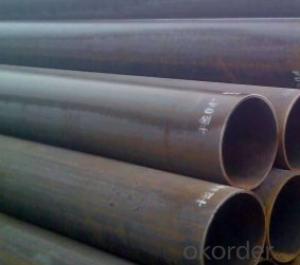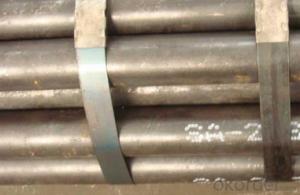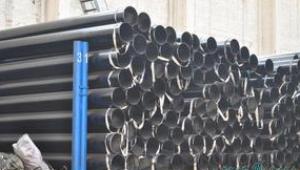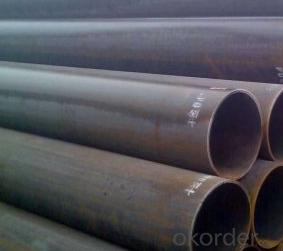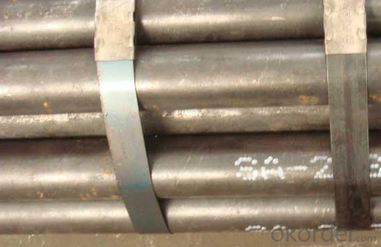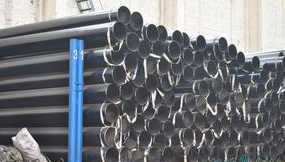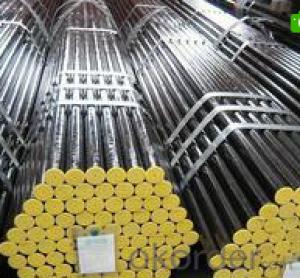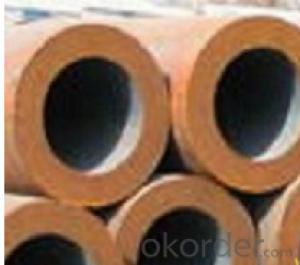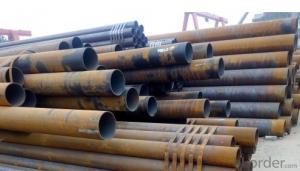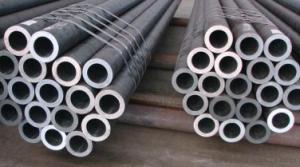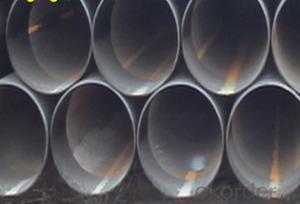Schedule 40 ASTM A53 API 5L GR.B Carbon Seamless Steel Tubes X65 CNBM
- Loading Port:
- Qingdao
- Payment Terms:
- TT OR LC
- Min Order Qty:
- 10 pc
- Supply Capability:
- 30 pc/month
OKorder Service Pledge
OKorder Financial Service
You Might Also Like
Quick Details
| Thickness: | 2.0 - 85 mm | Section Shape: | Round | Outer Diameter: | 17 - 914.4 mm |
| Secondary Or Not: | Non-secondary | Application: | Oil Pipe | ||
| Technique: | Hot Rolled | Certification: | API | Surface Treatment: | VARNISH PAITING |
| Special Pipe: | API Pipe | Alloy Or Not: | Non-alloy | END: | PLAIN,BEVELED OR THREADED |
| Grade: | 10#,20#,16Mn,A106(B,C),A210,A335 P5,A335 P91,A53(A,B),API J55,API K55,Q195,Q235,Q345,St37,St52,10#-45#,A53-A369,API J55-API P110,Q195-Q345,ST35-ST52 | Standard: | API 5CT,API 5L,ASME B36.19M-2004,ASTM A106-2006,ASTM A179-1990,ASTM A182-2001,ASTM A53-2007,BS 1387,DIN 1629/3,DIN EN 10216-1-2004,GB 5310-1995,GB/T 3091-2001,GB/T 8162-1999,GB/T 8163-1999,JIS G3454-2007,API,ASTM,BS,DIN,GB,JIS |
Packaging & Delivery
| Packaging Detail: | standard packing suitable shipping by sea.fixed length as customers' requirements, or SRL or DRL. Varnish, painting or galvanized, or FBE ,2PE,3PE 3pp coating,bevelled/plain/threaded ends with caps, packing in bundle (OD smaller than 141.3mm) big sizes packing in loose, marking as required. Shipped by sea,by air,by train . or some samples shipped by DHL,EMS,TNT,FEDEX ect. Length shorter than 5.85m should be shipped by 20' container, 5.85-12m shipped by 40' container. |
| Delivery Detail: | 7-35 days after advance payment |
Product Description
Seamless steel pipes, a large number of used pipes conveying fluids, such as transport oil, natural gas, gas, water pipes and some solid materials, and so on. Compared to other steel and solid steel bar, the same torsional strength in bending, lighter, is an economic cross-section steel, widely used in the manufacture of structural parts and mechanical parts, such as drill pipe, automotive drive shafts, bicycle rack and construction using steel scaffolding ring with steel pipe manufacturing parts, can improve material utilization, simplify the manufacturing process, saving material and machining time, such as bearing rings, jack sets, has been widely used to manufacture steel. Steel or a variety of conventional weapons indispensable material, gun barrels to make steel. Steel shapes in different cross-sectional area can be divided into tube and shaped tubes. As in the perimeter of equal conditions, the largest area of a circle with a circular tube can carry more fluid. In addition, the circular cross section to withstand internal or external radial pressure, the force is uniform, so the vast majority of the pipe is pipe.
- Q: What are the factors to consider when selecting steel pipes for a project?
- When selecting steel pipes for a project, several factors need to be considered. These include the intended use of the pipes, the type and grade of steel required, the dimensions and specifications needed, the environmental conditions the pipes will be exposed to, and the budgetary constraints of the project. Additionally, factors such as corrosion resistance, strength, durability, and ease of installation should also be taken into account. Overall, careful consideration of these factors ensures that the selected steel pipes are suitable for the specific project requirements.
- Q: How do steel pipes perform in high-temperature environments?
- Steel pipes perform well in high-temperature environments due to their inherent strength and heat resistance. They can withstand extreme temperatures without losing their structural integrity or deforming, making them suitable for various industrial applications such as steam pipelines, power plants, and refineries. The high melting point of steel allows it to maintain its mechanical properties even at elevated temperatures, ensuring reliable and efficient operation in high-temperature environments.
- Q: How to establish a concrete-filled steel tubular column model in ANSYS?
- A two unit model or a composite unit model can be adoptedTwo units are constructed of steel tubes and concreteA composite unit may be either a fiber element or a section conversion attribute
- Q: What are the advantages of using steel pipes in industrial plants?
- Using steel pipes in industrial plants offers numerous advantages. Firstly, their exceptional strength and durability make them ideal for transporting materials and fluids under high temperatures, pressures, and heavy loads. Secondly, steel pipes have excellent resistance to corrosion, which is crucial in industrial settings where they encounter corrosive substances or harsh environmental conditions. This resistance ensures their longevity, prevents leaks, and eliminates potential hazards. Additionally, steel pipes are highly versatile. They can be easily fabricated and customized to meet specific requirements, including different sizes and shapes. This flexibility simplifies installation and maintenance, reducing downtime and improving overall efficiency. Moreover, steel pipes have a smooth interior surface, allowing for efficient material flow with minimal resistance and pressure drop. Their smoothness also prevents the accumulation of deposits and contaminants, ensuring a clean and hygienic environment. Furthermore, steel pipes exhibit high resistance to fire, providing an added layer of safety in industrial plants where fires can have disastrous consequences. Lastly, while the initial installation cost of steel pipes may be higher compared to other materials like plastic or copper, their durability and low maintenance requirements result in significant long-term cost savings. With a long lifespan and resistance to corrosion and damage, the need for frequent replacements or repairs is minimized. In conclusion, the use of steel pipes in industrial plants offers various advantages, including strength, durability, corrosion resistance, versatility, efficient flow, fire resistance, and cost-effectiveness. These qualities make steel pipes a reliable and efficient choice for diverse applications within industrial facilities.
- Q: How are steel pipes used in plumbing?
- Steel pipes are commonly used in plumbing for various applications such as water supply and drainage systems. They provide durability, strength, and resistance to corrosion, making them suitable for both residential and industrial plumbing. Steel pipes can be used for transporting water, gases, and other fluids, and are often connected with fittings and valves to create a reliable and efficient plumbing system.
- Q: What are the different methods of pipe support for steel pipes?
- There are several different methods of pipe support for steel pipes, each designed to ensure the stability, alignment, and protection of the pipes. Some of the most commonly used methods include: 1. Pipe Hangers: These are devices that suspend or support the weight of the pipe from above. They are typically made of metal and can be adjustable or fixed, allowing for easy installation and maintenance. Pipe hangers can be used in various configurations, such as clevis hangers, beam clamps, or pipe rollers, depending on the specific application. 2. Pipe Shoes: These are supports that are directly attached to the bottom of the pipe, providing a stable resting surface. Pipe shoes are usually made of steel or other durable materials and are designed to prevent pipe movement, absorb vibrations, and distribute the weight evenly. They are commonly used in applications where pipes are subjected to high temperatures or where there is a need for thermal expansion. 3. Pipe Clamps: These are devices used to hold or fasten the pipes together or to a structure. Pipe clamps are typically made of metal and come in various sizes and designs to accommodate different pipe diameters and configurations. They provide support and prevent the pipes from sagging or moving, especially in areas where there are changes in direction or elevation. 4. Pipe Racks: These are structures that are specifically designed to support multiple pipes in an organized and secure manner. Pipe racks are commonly used in industrial settings, such as refineries or power plants, where large quantities of pipes need to be stored or supported. They are typically made of steel and can be customized to accommodate different pipe sizes and layouts. 5. Pipe Guides: These are devices that help guide and control the movement of the pipe, especially during thermal expansion or contraction. Pipe guides are typically fixed to the structure and provide a sliding surface to allow for the longitudinal movement of the pipe. They are commonly used in applications where there are changes in temperature, such as in steam or hot water systems. These are just a few of the many methods of pipe support for steel pipes. The choice of support method depends on factors such as pipe size, weight, temperature, and the specific requirements of the application. It is crucial to select the appropriate support method to ensure the longevity and integrity of the pipes and to prevent any potential issues such as sagging, misalignment, or failure.
- Q: Are steel pipes resistant to earthquakes?
- Compared to other materials like concrete or PVC pipes, steel pipes are commonly regarded as more resistant to earthquakes. This is because steel possesses inherent properties such as high tensile strength and flexibility. These properties enable steel pipes to effectively absorb and distribute seismic energy during an earthquake, enabling them to endure shaking and ground movements more effectively. Moreover, steel pipes have the capability to deform without rupturing or collapsing, reducing the risk of structural failure. However, it is crucial to note that the earthquake resistance of steel pipes ultimately relies on various factors including the design, installation, and overall structural integrity of the piping system. To ensure the highest level of earthquake resistance for steel pipes, it is imperative to adhere to proper engineering and construction practices.
- Q: There are multiple welded galvanized steel pipe outer diameter 108mm wall thickness 4mm length of 6 meters
- Galvanized steel pipe wall thickness weight outer diameter 108mm 4mm 6 meters in length is about 10.26*6*1.06=65 kg.Kg/m= (outside diameter mm-, wall thickness mm) * wall thickness mm*0.02466= (108-4) *4*0.02466=10.26 kg / MBecause of galvanizing, the weight is heavier than that of ordinary welded pipe 3%~6%.
- Q: How are steel pipes transported from the manufacturing site to the construction site?
- Steel pipes are typically transported from the manufacturing site to the construction site using various methods such as trucks, trains, ships, or even by air. The most common mode of transportation is trucks, which allow for easy and efficient delivery directly to the construction site.
- Q: What are the different types of steel pipes?
- There are several different types of steel pipes, including seamless pipes, welded pipes, galvanized pipes, and stainless steel pipes.
Send your message to us
Schedule 40 ASTM A53 API 5L GR.B Carbon Seamless Steel Tubes X65 CNBM
- Loading Port:
- Qingdao
- Payment Terms:
- TT OR LC
- Min Order Qty:
- 10 pc
- Supply Capability:
- 30 pc/month
OKorder Service Pledge
OKorder Financial Service
Similar products
Hot products
Hot Searches
Related keywords
